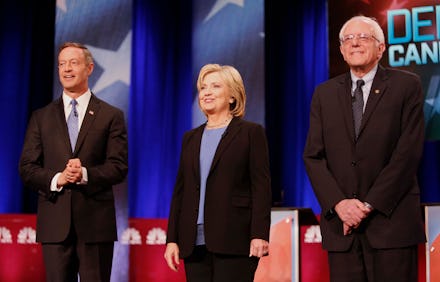The Democratic Debate Proves We're Living in the Age of Obama

Charleston, South Carolina — President Barack Obama was some 600 miles away from the Democratic presidential debate here on Sunday night, but he proved to be a looming presence throughout the contentious face-off between the leading candidates, former Secretary of State Hillary Clinton and Sen. Bernie Sanders (I-Vt.).
As Obama's transformative presidency nears its end, the Democratic Party finds itself at a crossroads in navigating his legacy, confronted with a choice between a candidate who pitches herself as a pragmatic progressive who will build on the Obama record, and one who promises a "political revolution" to achieve even more far-reaching change than the president who ushered in a landmark health care reform law, financial reform and measures to combat climate change.
If the period from 1980 to 2008 was the Age of Reagan — an era in which even Bill Clinton's Democratic Party sought to accommodate itself to conservative attitudes on issues like crime, welfare and the role of government — Sunday night's debate underscored that we now live in the Age of Obama, defined by deep-seated divisions over an administration that has, as Obama once said of Reagan, "changed the trajectory of America."
The risks: For all the sweeping policy proposals Clinton and Sanders have rolled out over the course of their campaigns, the simple truth is that if Democrats hang on to the presidency in November, the next four years will largely be spent safeguarding Obama's achievements and fending off congressional Republicans, who will likely retain control of at least the House of Representatives. Meanwhile, a Republican victory in November would jeopardize the administration's domestic and foreign achievements, ensuring that Democrats would spend the next four years pulling out whatever legislative stops they could to prevent a total rollback of Obama's policies.
Still, there's a deep rift between Clinton and Sanders over health policy, an issue that has bitterly divided Americans since Obama began his presidency with a push for reform. Both candidates want to take further steps to reshape the health care system: Clinton on Sunday reiterated her call for measures to cap out-of-pocket costs and rein in prescription drug prices. But Sanders would go much further, replacing the private insurance system with a government-run single-payer program like Medicare.
Single-payer is broadly popular among Democratic voters, with polls showing upwards of three-quarters of Democrats in support. (Even Clinton campaign chairman John Podesta is a fan.) But the basic question Clinton poses is this: Is it worth expending precious political capital to revisit one of the Democratic Party's core domestic policy achievements?
"I do not to want see the Republicans repeal it and I don't to want see us start over again with a contentious debate. I want us to defend and build on the Affordable Care Act and improve it," she said during the debate, simultaneously embracing Obama and offering herself as the candidate who will stop an increasingly conservative GOP from radically remaking domestic policy.
Though Sanders has previously called the Affordable Care Act a "good Republican program," as he woos Democratic voters he now feels compelled to applaud the law's achievements, noting that he voted for its 2010 passage and vowing, "No one is tearing this up. We're going to go forward."
Speaking with reporters after the debate, Sanders campaign manager Jeff Weaver said that Obama's health reform marked an "incredible step forward" for access to health insurance, applauding the law for cutting the uninsured rate and ending discrimination against those with pre-existing conditions. In proposing single-payer, Sanders' aim isn't to denigrate Obama's achievement, but to take another step toward universal insurance, Weaver said.
Defending the Obama record: But in the Clinton campaign's estimation, Sanders' fire-breathing populism — capitalizing on popular anger at Wall Street and the "billionaire class" — risks feeding the perception that Obama has been an inadequate president, a message that could undercut the party in the general election.
With Obama polling at 81% approval among Democrats in a recent New York Times/CBS News survey, Clinton also hopes that Sanders' implicit criticism of the president — that he hasn't done enough to take on big banks, that his health reform didn't go far enough, that income inequality proceeded apace on his watch — will hurt Sanders' Democratic primary bid.
Notably, on one of her core vulnerabilities, her Wall Street ties, Clinton wielded Obama as a line of defense against Sanders on Sunday night.
"I don't take money from big banks. I don't get personal speaking fees from Goldman Sachs," Sanders began his attack, pledging that he'd be a Theodore Roosevelt-style "trust-buster" and implying that Clinton would not.
Clinton responded that she agreed with Sanders that too-big-to-fail institutions needed to be broken up.
"But where we disagree," she added, "is the comments that Sen. Sanders has made that don't just affect me — I can take that — but he's criticized President Obama for taking donations from Wall Street. And President Obama has led our country out of the Great Recession."
Noting that Sanders once called for a progressive to mount a 2012 primary challenge to Obama in part because of his alleged softness on Wall Street, Clinton said that she would "defend Dodd-Frank," the administration's 2010 financial overhaul law.
"And I'm going to defend President Obama for taking on Wall Street, taking on the financial industry, and getting results," she added.
The Sanders campaign isn't keen on Clinton's effort to tether herself to Obama.
Referencing Obama and Clinton's hard-fought 2008 primary battle, Weaver told reporters after the debate, "If Secretary Clinton had had her way in 2008, there never would have been a President Barack Obama."
Water under the bridge, as the Clintonites see it. The plain fact is that there has been a President Barack Obama. With a Republican Party whose existential mission has become the erasure of Obama's legacy, the open question is whether that legacy will survive into the next decade.